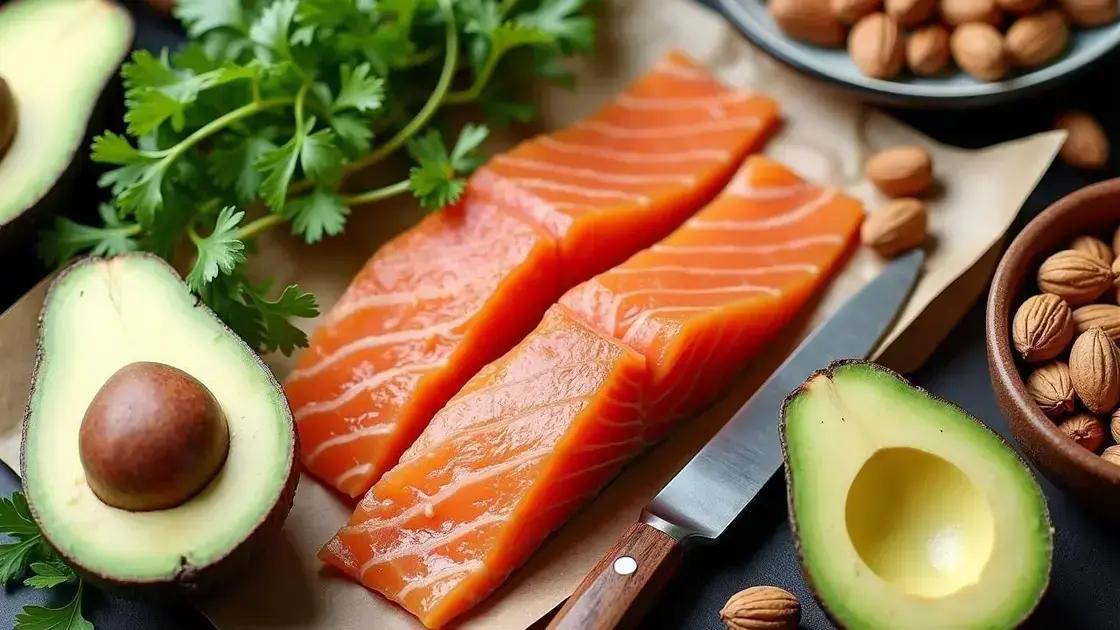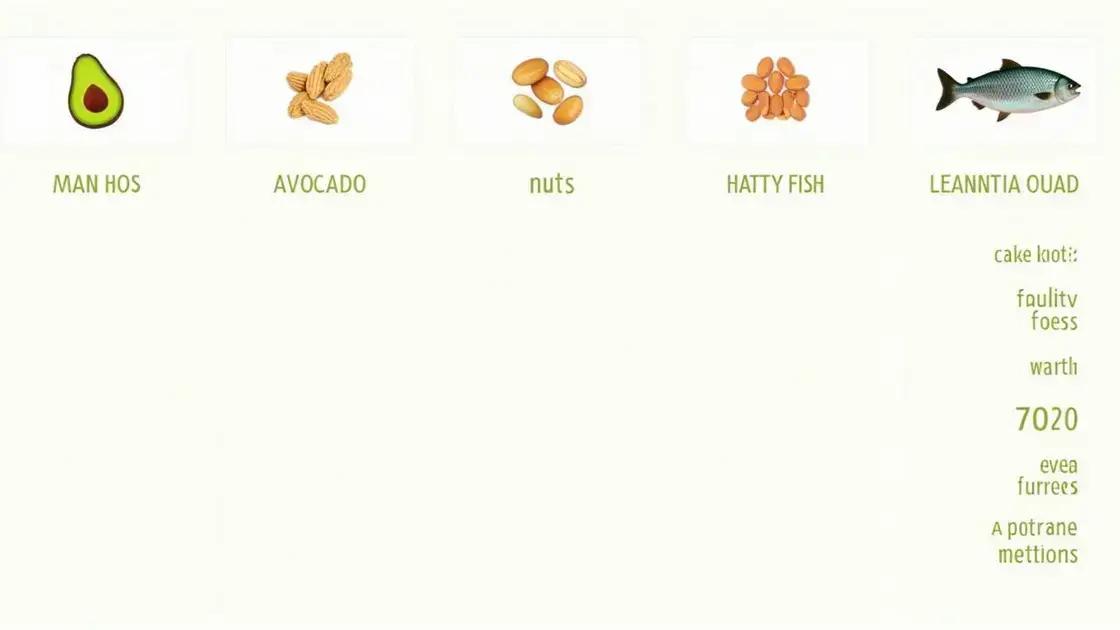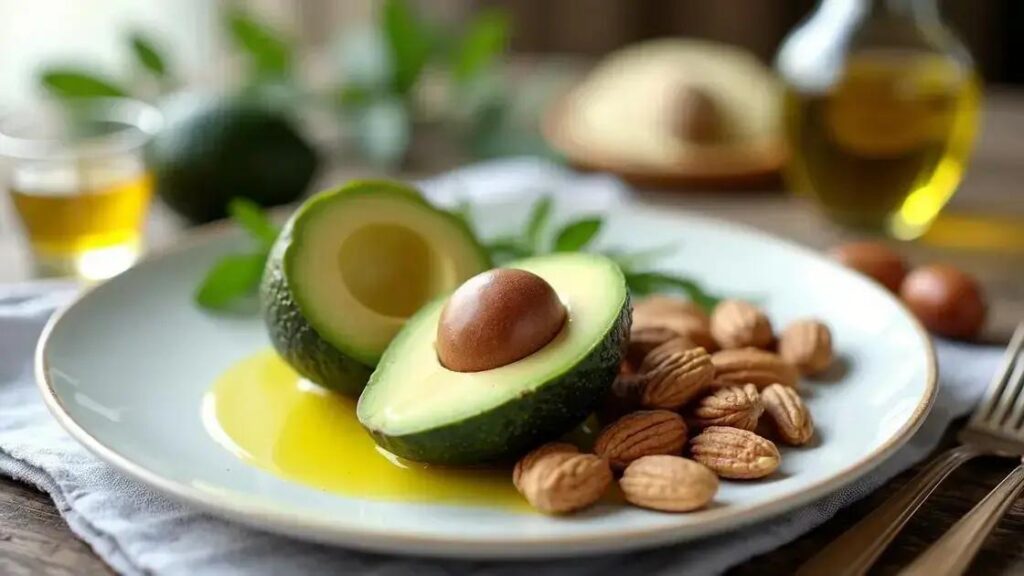Incorporating healthy fats into your diet effectively means understanding the different types of fats, recognizing their benefits, and finding easy ways to add them to your meals while dispelling common myths. Healthy fats support heart and brain health, help absorb essential nutrients, and can assist in weight management.
Incorporating healthy fats into your diet is essential for optimal health and well-being. Healthy fats can improve heart health, support brain function, and help you maintain a healthy weight. This article will guide you through the types of healthy fats, their benefits, and practical ways to add them to your meals. Learn how to make smarter choices and debunk common myths, ensuring you’re on the right path to a healthier lifestyle.
Understanding Healthy Fats

Understanding healthy fats is crucial for enhancing your overall health. While fats are often viewed negatively, it’s important to realize that not all fats are created equal. There are different types of fats: saturated, unsaturated, and trans fats. Each type plays a different role in our bodies, making it vital to understand their distinctions.
Saturated fats are typically solid at room temperature and are found in items like red meat, butter, and dairy products. While these fats are fine in moderation, excessive consumption can increase cholesterol levels and risk of heart disease.
Unsaturated fats, on the other hand, are liquid at room temperature and can be beneficial when included in a balanced diet. They are categorized into monounsaturated and polyunsaturated fats. Monounsaturated fats are found in sources such as olive oil, avocados, and nuts. Polyunsaturated fats include omega-3 and omega-6 fatty acids, which are found in fatty fish, flaxseeds, and walnuts.
Trans fats are the least healthy option. These are often created through industrial processes that add hydrogen to liquid oils, making them solid. Trans fats are commonly found in fried foods and baked goods. Consuming trans fats can raise bad cholesterol levels while lowering good cholesterol, which poses serious health risks.
Incorporating healthy, unsaturated fats into your diet can help combat inflammation, improve heart health, and provide essential fatty acids that your body cannot produce. It’s essential to differentiate healthy fats from harmful ones and make informed dietary choices.
Benefits of Healthy Fats in Your Diet

Healthy fats provide numerous benefits that can significantly improve your overall health. Including these fats in your diet is not only tasty but also essential for your well-being.
Support Heart Health
One of the most significant benefits of healthy fats is their ability to promote heart health. Unsaturated fats, especially omega-3 fatty acids found in fish and walnuts, can help reduce cholesterol levels, lower blood pressure, and decrease the risk of heart disease.
Enhance Brain Function
Healthy fats are important for brain function. The brain is primarily composed of fat, and certain fats, like omega-3 and omega-6, are crucial for brain development and function. A diet rich in these fats can support memory and cognitive performance.
Provide Essential Nutrients
Fat-soluble vitamins such as vitamins A, D, E, and K depend on dietary fat for absorption. Including healthy fats in your meals can help ensure you’re getting these important nutrients. This is essential for maintaining good health and preventing deficiencies.
Assist in Weight Management
Eating healthy fats can contribute to weight management. These fats promote a feeling of fullness, which can help you control your appetite. When consumed in moderation, they provide energy without leading to weight gain, making it easier to maintain a healthy weight.
Additionally, healthy fats play a role in metabolism and the regulation of insulin, further enhancing your body’s ability to manage weight effectively.
Easy Ways to Add Healthy Fats

Adding healthy fats to your diet can be simple and enjoyable. Here are some easy ways to incorporate them into your meals:
1. Use Olive Oil
Replace butter with olive oil for cooking or as a salad dressing. Olive oil is rich in monounsaturated fats and adds a delicious flavor.
2. Snack on Nuts and Seeds
Keep nuts and seeds on hand for a quick snack. Options like almonds, walnuts, and chia seeds offer healthy fats along with protein and fiber.
3. Add Avocado to Meals
Slice avocado and add it to sandwiches, salads, or smoothies. It’s creamy, delicious, and packed with healthy fats.
4. Include Fatty Fish
Incorporate fatty fish like salmon, mackerel, or sardines into your weekly meals. These fish are high in omega-3 fatty acids, which are great for your heart.
5. Use Nut Butters
Spread nut butters like almond or peanut butter on whole-grain toast, or use them in smoothies and desserts for added flavor and nutrition.
6. Choose Full-Fat Dairy
When selecting dairy products, opt for full-fat options like yogurt or cheese. They can be more satisfying and can help your body absorb nutrients better.
By incorporating these easy methods, you can enhance your meals with healthy fats, boosting flavor and nutrition.
Common Myths About Healthy Fats

Many people hold common myths about healthy fats that can lead to confusion about nutrition. Let’s debunk some of these misconceptions:
Myth 1: All Fats Are Bad
This is a widespread belief, but not all fats are harmful. In fact, healthy fats are essential for your body. They provide energy, support cell growth, and help you absorb vital nutrients.
Myth 2: Eating Fat Makes You Fat
Many think that including fats in their diet will lead to weight gain. However, healthy fats can promote satisfaction and prevent overeating. Moderation is key, and they can fit into a balanced diet.
Myth 3: Low-Fat Foods Are Always Healthier
Low-fat foods often replace fat with sugars or additives, which may not be healthier. Sometimes, full-fat options can be more nutritious and satisfying. Always check the ingredient list.
Myth 4: All Types of Fat Are the Same
Not all fats provide the same health benefits. Unsaturated fats are good for your heart, while trans fats and excessive saturated fats can increase health risks. It’s important to choose the right types of fats.
Myth 5: Healthy Fats Are Only in Certain Foods
Some people believe that healthy fats are limited to specific sources like avocados and nuts. However, healthy fats can be found in various foods, including olive oil, fatty fish, and seeds.
By understanding these myths, you can make better choices about incorporating healthy fats into your diet and embrace their benefits.
Embracing Healthy Fats for a Better Diet
Incorporating healthy fats into your diet is essential for overall health. By understanding the types of fats, their benefits, and how to easily add them to your meals, you can make a positive impact on your nutrition.
Don’t let common myths deter you from including healthy fats in your daily meals. Instead, focus on making informed choices that enhance your well-being and support a balanced diet.
Remember, healthy fats are not just a delicious addition to your meals; they play a vital role in heart health, brain function, and nutrient absorption. Embrace these nutritious fats and enjoy the delicious flavors they bring to your plate.
FAQ – Frequently Asked Questions About Healthy Fats
What are healthy fats?
Healthy fats are types of dietary fats that provide essential nutrients and promote heart health. They are typically found in foods like avocados, nuts, seeds, and fatty fish.
Why are healthy fats important for my diet?
Healthy fats are important because they support brain function, aid in nutrient absorption, and help reduce the risk of heart disease. They can also keep you feeling full longer.
How can I add more healthy fats to my meals?
You can add healthy fats to your meals by using olive oil, snacking on nuts, including avocados, and consuming fatty fish like salmon.
Are all fats bad for you?
No, not all fats are bad. It’s important to differentiate between healthy fats, like unsaturated fats, and unhealthy ones, like trans fats.
What are some common myths about healthy fats?
Some common myths include that all fats are bad, that eating fat makes you fat, and that low-fat foods are always healthier.
Can I have healthy fats and still lose weight?
Yes, including healthy fats in moderation can help you feel full and satisfied, which can assist in weight management as part of a balanced diet.












